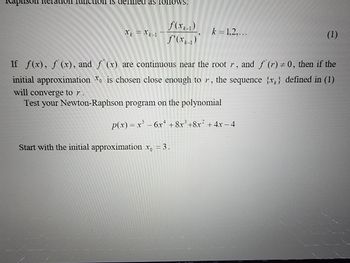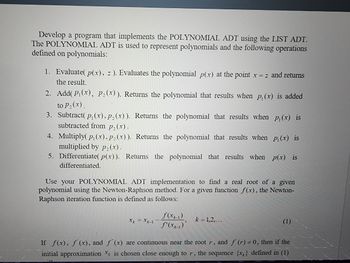
Database System Concepts
7th Edition
ISBN: 9780078022159
Author: Abraham Silberschatz Professor, Henry F. Korth, S. Sudarshan
Publisher: McGraw-Hill Education
expand_more
expand_more
format_list_bulleted
Question
Program in C

Transcribed Image Text:on nction is defined as follows:
X = X-1
f(x)
f'(x)
k = 1,2,...
Start with the initial approximation x = 3.
(1)
If f(x), f (x), and f(x) are continuous near the root r, and f (r) = 0, then if the
initial approximation is chosen close enough to r, the sequence {x} defined in (1)
will converge to r.
Test your Newton-Raphson program on the polynomial
p(x) = x² - 6x +8x³+8x² + 4x − 4

Transcribed Image Text:Develop a program that implements the POLYNOMIAL ADT using the LIST ADT.
The POLYNOMIAL ADT is used to represent polynomials and the following operations
defined on polynomials:
1. Evaluate(p(x), =). Evaluates the polynomial p(x) at the point x = z and returns
the result.
2. Add(P₁(x), P₂(x)). Returns the polynomial that results when p₁(x) is added
to P₂ (x).
3. Subtract(p, (x), p₂(x)). Returns the polynomial that results when p, (x) is
subtracted from p₂(x).
4. Multiply(p₁(x), p₂(x)). Returns the polynomial that results when p₁(x) is
multiplied by p₂(x).
5. Differentiate( p(x)). Returns the polynomial that results when p(x) is
differentiated.
Use your POLYNOMIAL ADT implementation to find a real root of a given
polynomial using the Newton-Raphson method. For a given function f(x), the Newton-
Raphson iteration function is defined as follows:
X = X-1
f(xx-1)
f'(xx-1)'
k = 1,2,...
(1)
If f(x), f'(x), and f(x) are continuous near the root r, and f'(r) = 0, then if the
initial approximation to is chosen close enough to r, the sequence {x} defined in (1)
Expert Solution
This question has been solved!
Explore an expertly crafted, step-by-step solution for a thorough understanding of key concepts.
This is a popular solution
Trending nowThis is a popular solution!
Step by stepSolved in 2 steps

Knowledge Booster
Learn more about
Need a deep-dive on the concept behind this application? Look no further. Learn more about this topic, computer-science and related others by exploring similar questions and additional content below.Similar questions
- In what ways might expanding one's repertoire of programming languages be useful beyond mastery of one or two?arrow_forwardDoes strong typing and weak typing in a computer language both have their own set of benefits and drawbacks?arrow_forwardConsider an algorithm that contains a loop that can be expressed with the following pseudocode: for( i = 1 through n ){Task T} If Task T requires t time units, how many time units (in terms of t) does the entire loop require? options: a) i b) n c) n * t d) n^2 e) n^2 * tarrow_forward
- In what ways may one benefit from using dynamic programming?arrow_forwardDo the two programming languages vary from one another?arrow_forwardSuppose that you have a singly linked list with five nodes and with head reference. Then the statement head = head.next will remove the first node of the linked list? a) true b) falsearrow_forward
arrow_back_ios
arrow_forward_ios
Recommended textbooks for you
 Database System ConceptsComputer ScienceISBN:9780078022159Author:Abraham Silberschatz Professor, Henry F. Korth, S. SudarshanPublisher:McGraw-Hill Education
Database System ConceptsComputer ScienceISBN:9780078022159Author:Abraham Silberschatz Professor, Henry F. Korth, S. SudarshanPublisher:McGraw-Hill Education Starting Out with Python (4th Edition)Computer ScienceISBN:9780134444321Author:Tony GaddisPublisher:PEARSON
Starting Out with Python (4th Edition)Computer ScienceISBN:9780134444321Author:Tony GaddisPublisher:PEARSON Digital Fundamentals (11th Edition)Computer ScienceISBN:9780132737968Author:Thomas L. FloydPublisher:PEARSON
Digital Fundamentals (11th Edition)Computer ScienceISBN:9780132737968Author:Thomas L. FloydPublisher:PEARSON C How to Program (8th Edition)Computer ScienceISBN:9780133976892Author:Paul J. Deitel, Harvey DeitelPublisher:PEARSON
C How to Program (8th Edition)Computer ScienceISBN:9780133976892Author:Paul J. Deitel, Harvey DeitelPublisher:PEARSON Database Systems: Design, Implementation, & Manag...Computer ScienceISBN:9781337627900Author:Carlos Coronel, Steven MorrisPublisher:Cengage Learning
Database Systems: Design, Implementation, & Manag...Computer ScienceISBN:9781337627900Author:Carlos Coronel, Steven MorrisPublisher:Cengage Learning Programmable Logic ControllersComputer ScienceISBN:9780073373843Author:Frank D. PetruzellaPublisher:McGraw-Hill Education
Programmable Logic ControllersComputer ScienceISBN:9780073373843Author:Frank D. PetruzellaPublisher:McGraw-Hill Education

Database System Concepts
Computer Science
ISBN:9780078022159
Author:Abraham Silberschatz Professor, Henry F. Korth, S. Sudarshan
Publisher:McGraw-Hill Education

Starting Out with Python (4th Edition)
Computer Science
ISBN:9780134444321
Author:Tony Gaddis
Publisher:PEARSON

Digital Fundamentals (11th Edition)
Computer Science
ISBN:9780132737968
Author:Thomas L. Floyd
Publisher:PEARSON

C How to Program (8th Edition)
Computer Science
ISBN:9780133976892
Author:Paul J. Deitel, Harvey Deitel
Publisher:PEARSON

Database Systems: Design, Implementation, & Manag...
Computer Science
ISBN:9781337627900
Author:Carlos Coronel, Steven Morris
Publisher:Cengage Learning

Programmable Logic Controllers
Computer Science
ISBN:9780073373843
Author:Frank D. Petruzella
Publisher:McGraw-Hill Education